Driving commercial and political engagement between Asia, the Middle East and Europe
Driving commercial and political engagement between Asia, the Middle East and Europe
Driving commercial and political engagement between Asia, the Middle East and Europe
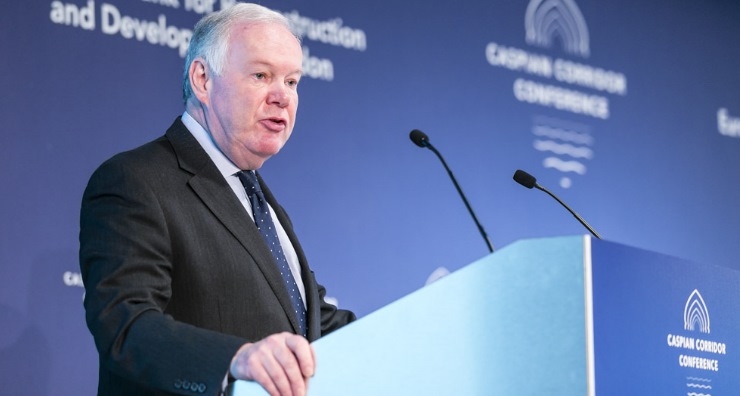
British businesses and financial institutions are being urged to take advantage of the rich opportunities in the Caspian region. Apart from having huge natural reserves of gas and oil that will be transported to Europe in the future, the region is also diversifying its economy away from hydrocarbons.
However, at the same time the countries in the region still need to make themselves more attractive to investors.
That was one of the key messages from the 3rd Caspian Corridor Conference, co-organised by Asia House, the International Bank of Azerbaijan, The CityUK and the Britain Azerbaijan Business Council (BABC), held on 12 March at the European Bank for Reconstruction and Development (EBRD) in London.
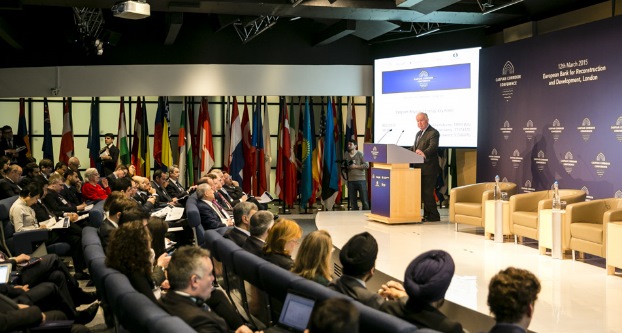
The 3rd Caspian Corridor Conference, held at the European Bank for Reconstruction and Development in London. Copyright Miles Willis Photography
The aims of the conference included promoting free trade and cross border investment, increasing regional cooperation, discussing building a safer economic and energy corridor between Asia and Europe, exchanging ideas on energy diversification and addressing the region’s challenges.
Government ministers, politicians, policy makers, investors, lawyers, business leaders, decision makers, thought leaders, bankers and academics from the region and from the UK attended.
The EBRD taps into the city of London to attract investments from all over the world in energy, manufacturing and finance for the benefit of its shareholders, which include the European Union and 64 countries, which include Kazakhstan, Tajikistan and Turkmenistan.
Giving a keynote speech at the event, Charles Hendry MP, the UK Prime Minister’s Trade Envoy to Kazakhstan, Azerbaijan and Turkmenistan, insisted that British companies could benefit much more from opportunities in the Caspian region.
“We need to be more assertive in looking for opportunities and helping British companies take advantage of them,” he said.
Mr Hendry has so far made 15 visits to the region, often with trade delegations. He said cooperation between the UK started with energy but “we want to broaden that.”
“They [countries in the region] are open to business, particularly with the UK. The message I hear so often is, ‘Why don’t we see more British companies here as much as we see French and Italian ones?’ My job is to ratchet up the number of British companies going there. They are ambitious and have some of the best universities in the region. They will not wait so I urge you to make it happen,” he told the delegates.
“More than 90 per cent of exports from Azerbaijan are hydrocarbons. The question is how to boost exports in other sectors. British companies should work with these countries and also with Turkish companies as they move into these markets,” he explained.
“We hope we can do this with Iran as well, if we can move away from sanctions. Twenty million Azerbaijanis live in Iran – so it’s a significant part of the Iranian population and they understand Iran in a way we do not. UK companies could partner with industrial groups to move into Iran,” he added.
He said that British companies such as BP and Shell brought international investment, skills and expertise so that countries such as Turkmenistan, Kazakhstan and Azerbaijan could realise their assets of huge reserves of gas.
“They [BP and Shell] are guests in these countries. As these countries look to upskill their population then they will work with them and through that investment they will make it possible to realise these resources so it is a genuine partnership. Our job is to work with these countries to help them realise his plans and ambitions. These countries hold a unique position between Europe, Russia and China,” he said.
He added: “We need new routes to bring new sources of gas to Europe for the sake of European energy security.”
The US$45 billion Southern Gas Corridor, which is being created to transport gas from the Shah Deniz II gas field in Azerbaijan to Europe for the first time by 2020, involves an expansion of the South Caucasus gas pipeline, construction of the Trans-Anatolian (TANAP) and construction of Trans-Adriatic (TAP) gas pipeline.
Six billion cubic meters per annum (bcm/a) of Azerbaijan’s gas will be produced from the second stage of the Shah Deniz project to be delivered to Turkey by 2019 and 10 bcm/a will be supplied to Europe by 2020.
The Southern Gas Corridor is a critical part of a new energy and economic corridor opening up between the Caspian region and Europe, which will it create tens of thousands of jobs and offer energy security and a regular supply of gas to Europe. It is also considered to be part of the ‘New Silk Road’, a return to ancient trading routes with the construction of infrastructure and transport links to link China with Europe through Central and Western Asia.
Mr Hendry, the MP for Wealden, who is not standing for re-election in May, added: “I hope we will see Turkmenistan gas coming into Europe. Turkmenistan is looking at whether it should sell gas to China or India so we have to make the most compelling case that they should be coming westwards. These countries are recognising their strategic importance. They are young ambitious countries.”
He added: “We are seeing a programme of reforms set out that will make them more attractive to investors.”
Reforms being introduced in the region included adhering to the Rule of Law, civil service reform (making sure the public sector is not corrupt), broadening the economic base of countries (encouraging the emergence of SMEs and diverse economies with less concentration on hydrocarbons), and adopting UK commercial law, as Kazakhstan was doing, he said.
“These are the most remarkable countries. I urge you to go and see the extraordinary opportunities. They have some of the best hotels in the world at a fraction of the price, great restaurants and great service, good airlines and regular routes,” he concluded.
“The Caspian region offers enormous opportunities for our finance sector for investment and development and it is a growing source of inward investment to the UK,” said Gary Campkin, Director, International Strategy, TheCityUK.
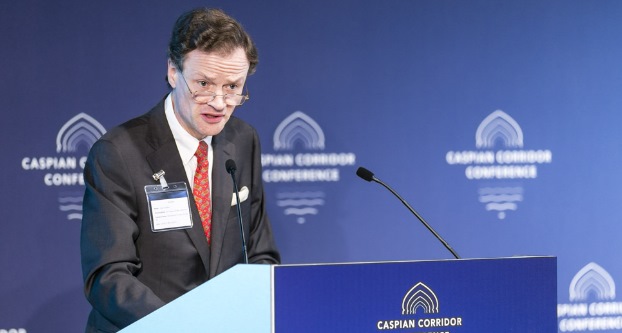
Gary Campkin, Director, International Strategy, TheCityUK, was one of the speakers at the 3rd Caspian Corridor Conference. Copyright Miles Willis Photography
He reiterated Mr Hendry’s views that region needed to make itself more attractive to investors by improving corporate governance, introducing English law and dispute resolution, having a diversification agenda away from oil and gas and by developing human capital. He pointed out that one of the hurdles was that outside hydrocarbons there were “talent gaps everywhere”.
He added the region needed regulatory and supervisory coherence, a business environment that’s innovative, a fiscal policy that’s clear, transparent and competitive and to be open to foreign investors.
Riccardo Puliti, Managing Director for Energy, EBRD, pointed out that energy security was a priority for the EU and other parts of the world.
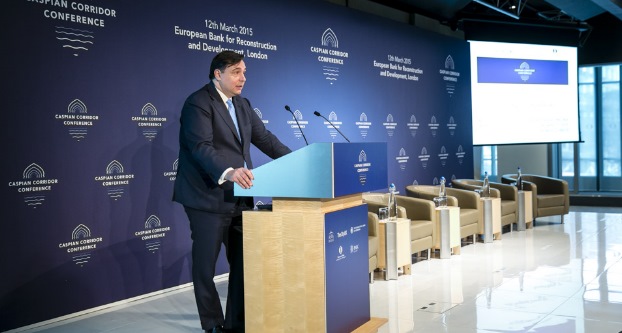
Riccardo Puliti, Managing Director for Energy, EBRD, gave a keynote speech at the 3rd Caspian Corridor Conference. Copyright Miles Willis Photography
“The Caspian Corridor (energy corridor between Central Asia and Europe) can diversify routes and sources,” he said. “It opens up the potential of delivering gas from Turkmenistan (the sixth largest natural gas reserve holder in the world), Azerbaijan and Kazakhstan to other countries in the region, to the EU and to southeast Europe.” He said, in the future, Iran (which has the world’s second largest gas reserve) and Iraq would supply gas to Europe.
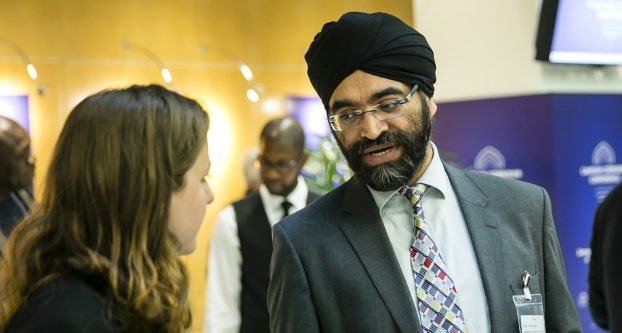
Delegates had the opportunity to make business contacts during the coffee breaks of the 3rd Caspian Corridor Conference. Copyright Miles Willis Photography
But he said the complexity of achieving all this should not be “underestimated” as it required in-depth legal and technical knowledge, finance and for many countries to work together. He said countries would have to comply with due diligence standards and engage procurement contractors with long and successful records.
“The EBRD supports the Caspian Corridor to enhance cooperation in the energy markets. We want to develop fair equitable energy markets,” he added.
“The Caspian region comprises some of the fastest-growing and most vibrant economies of the world,” said the Rt Hon The Lord Mayor Alan Yarrow, who first visited the region six years ago, and is travelling to Baku in May.
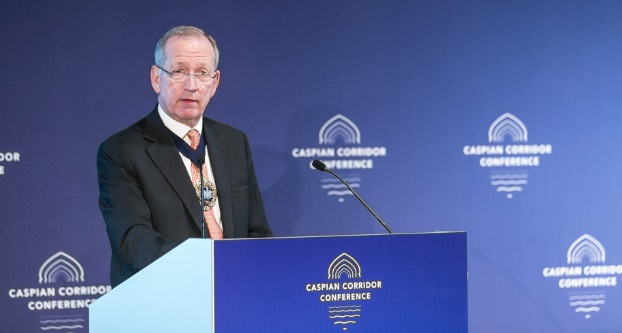
The Rt Hon The Lord Mayor Alan Yarrow gave an opening speech at the 3rd Caspian Corridor Conference. Copyright Miles Willis Photography
“I want to see how UK financial and professional services can add value and I want Caspian countries to tap into the expertise of UK banks,” he said.
He pointed out that the UK was the largest exporter of financial services in the world. It receives the most foreign direct investment of any country in Europe and was uniquely placed in Caspian.
“Azerbaijan specialises in finance and related professional services, energy, oil and gas. These are the key areas where we can work together to drive growth and prosperity,” he explained.
He said the dramatic drop in oil prices had in some ways had a positive impact on the region as it had spurred many countries on to diversify their economies away from what some described as the ‘curse of oil.’
The price of oil has actually halved globally since mid-2014. Economic growth in the Azerbaijan for example has now contracted considerably since the oil boom of 2003 to 2007 when the economy grew by an average of 21 percent per year, according to Reuters.
Azerbaijan’s gross domestic product (GDP) grew by just 2.1 per cent during the first half of 2014, sharply falling from five per cent in the same period in 2013. The slowdown reflects the sharp fall in oil GDP in the first half of 2014, which currently accounts for half of its GDP.
The non-oil economy in Azerbaijan on the other hand grew at seven per cent in 2014. In 2015 the non-oil sector is expected to make up 65 per cent of Azerbaijan’s GDP. It is currently 55 per cent. In Kazakhstan, GDP growth declined from six per cent in 2013 to 4.3 per cent in 2014.
“We in the UK want to support the economic diversification of the Caspian region. There is a significant diversification agenda underway in Kazakhstan and Azerbaijan,” Mr Yarrow said.
I have just got back from the Gulf where everyone was talking about the rise of the Swiss Franc and oil prices falling,” Mr Yarrow added. But he said it was speeding up diversification of industries away from hydrocarbons. However that was opening up a skills gap. So he said the Third Caspian Corridor Conference came at a “timely juncture.”
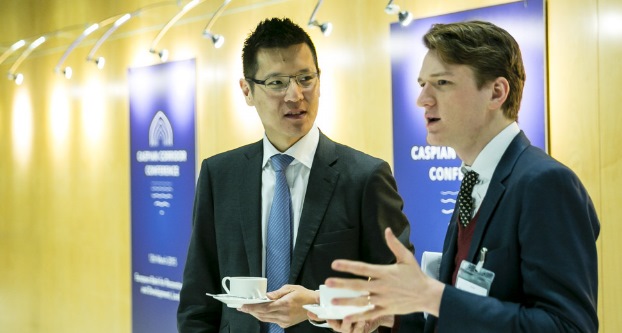
There were ample opportunities for networking at the 3rd Caspian Corridor Conference. Copyright Miles Willis Photography
Dr. Jahangir Hajiyev, chairman of the board, the International Bank of Azerbaijan, said: “The region is undergoing historic and unprecedented change. Azerbaijan has tried to become an economic game changer by diversifying its goods and services. The Baku Tbilisi Kars Railway will soon be completed connecting Baku with Kars in Northeast Turkey so the Caspian Corridor becomes a conduit of change between the East and West. We need more cross-border deals and investment. This will encourage our UK partners to spend more time in the region.”
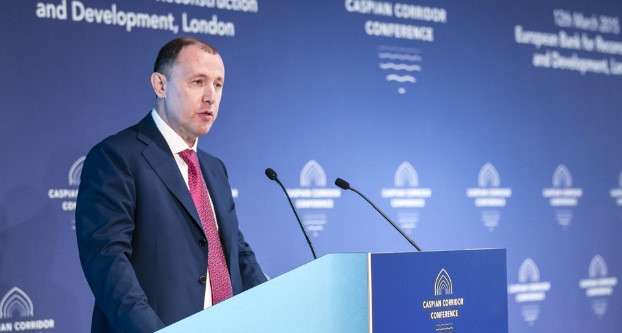
Dr Jahangir Hajiyev, Chairman, International Bank of Azerbaijan, spoke at the 3rd Caspian Corridor Conference. Copyright Miles Willis Photography
The First Caspian Corridor Conference was held at Lancaster House and the second conference, held last year, took place at the London Stock Exchange.
naomi.canton@asiahouse.co.uk
Our next Business & Policy event is the London launch of Asian Development Outlook 2015, the Asian Development Bank’s flagship economic publication. This will take place at Asia House on 27 March, when Juzhong Zhuang, Deputy Chief Economist at the Asian Development Bank, will unveil the findings of the report, which provides a comprehensive analysis of macroeconomic issues in developing Asia, with growth projections by country and region. More information.
